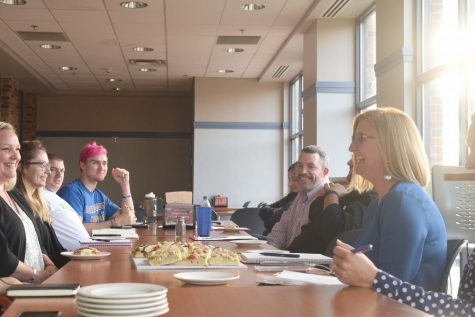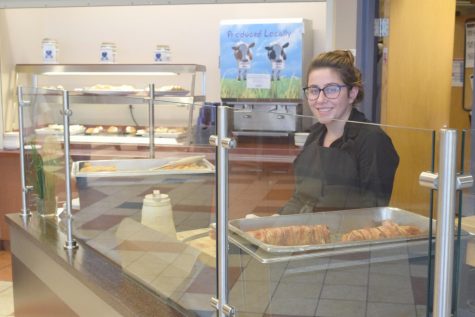Wilkes’ dining services holds food advisory board meeting
Wilkes Dining Services and Business Operations hosted the first food advisory board meeting for the semester on Sept. 24 in the atrium, the glass side room in Henry’s Dining Hall.
The food advisory board was attended by seven faculty from Dining Services and Business Operations and six other attendees consisting of both students and faculty. The items discussed varied from new additions to the dining hall, to discussion about visibility and accuracy of menu boards, and the important topic about food accessibility for those with specific dietary needs.
The board also focused on issues across all dining locations, which included both Henry’s Dining Hall and Rifkin Cafe in the SUB, and the food options in the Stark Learning Center such as the P.O.D. and Greens to Go.
The purpose of the Food Advisory Board is for students and faculty to offer feedback and suggestions for dining locations, such as improvements, new menu items, as well as raising any additional concerns. Many of the students present represented their fellow students, as multiple RAs were in attendance to discuss issues brought to them by their residents.

Numerous Food Services staff, including Food Service Director Rich Coburn and Executive Chef Matt Moss, are joined by students, including Michael Bennett and Jason DeBoard, for the September Food Advisory Board.
One of the first topics discussed were the improvements made to Henry’s Dining Hall. Aside from the new aesthetic makeover the dining hall received, there have also been improvements and changes to the menu based on the feedback that the dining hall received over the past year.
The first changes addressed were that Foodie, the end section near the desserts, has been converted to a made-to-order pasta station. The station features various pastas, ingredients and proteins, including vegan options. There was a discussion about the positive feedback that many students have had toward the pasta station.
“The pasta bar is awesome. With the old one, the sauce was not the greatest,” Brad Welsh, senior finance major said, “Them adding more vegan and gluten options is amazing as well.”
Despite positive feedback, the board still discussed potential changes in the long run that could make the Foodie station better.
One such change was changing the omelets that are served on weekends over at the pasta bar at around 2 p.m. This was discussed when students in attendance mentioned that some students wake up and might eat breakfast in their dorms, or may not want an omelet by the time they get to the dining hall later in the day.
The compromise to keep the popular omelets and offer another choice was to potentially move the omelets to the griddle at 2 p.m. and allow for the pasta bar to start up over in the Foodie section.
The next addition addressed was that breakfast favorites like pancakes, French toast, bacon, sausage and home-fries are now made-to-order from the grill in the morning. In addition to this, students brought up concerns about made-to-order foods, recounting experiences where the cafeteria staff exaggerated the amount of time needed for grilled chicken to be made.
The members of Food Services assured students that the chicken made takes roughly eight to 10 minutes and that at request they should be made without any problems. The exaggerated time was addressed as being incorrect information that they promised to address with workers after the food advisory board.
A new addition not addressed at the board was that students can now order personal-sized pizza with custom toppings.
The deli has been revised to feature signature sandwiches, faculty favorites and “wicked” wraps. There is a variety of new meats, cheeses, ingredients and breads which can be pressed.
The soups and ice cream have relocated behind pizza to make room for a brand new food area, the chef table. The table started up the week before the food advisory board took place.
Rich Coburn, Food Service Director said, “Over the summer we started looking to rejuvenate the dining and the station and options we have to offer. Moving forward on Tuesday and Thursday, maybe both, we are going to feature vegan dishes and maybe dairy-free dishes because that is a lot of the feedback we are getting.”
Executive Chef Matt Moss continued to expand on the way the chef’s table is going to work throughout the school year.
“It is a Monday through Friday station for lunch and dinner. Friday lunch will be a feature meal. We plan to do many different options. We are planning on doing upscale nights every Wednesday off that table,” Moss continued. “I think one of the big reasons this station works well is that the kids get to see exactly what goes on. It is right in front of them, they can watch it being made.”
The chef’s table, as well as the new food selection being provided, have been popular with students around campus.

Dining Hall staff hands out pork tenderloins wrapped in bacon to students as one of the first meals from the brand new chef’s table.
“I think it is a nice way to diversify our options,” said Gregory Navestad, senior marketing major, “It is nice that they are listening to us and making changes. The chef’s station great in that regard.”
Just as students had been noticing more options have been included in the weekend menus, the dining hall has also reintroduced donuts and smoothies at breakfast.
Food Services mentioned that they hope students reach out and propose new food options they would like to see both at the chef’s table and in the dining hall in general. They also discussed potentially bringing back taco Tuesdays as an option, as well as testing more diverse seafood options like halibut at the chef’s table to see if they would be a good fit for late night.
The next discussions focused on Rifkin, though students had no complaints with the services downstairs. However, there was talk of testing late night downstairs with a buffet-style option, allowing students to go back for more food if they desired. This idea was considered with commuters in mind, as students and faculty felt it may draw more commuters to the dining hall services if late night was downstairs on occasion.
No formal policy changes were made with regard to late night, but testing the change was considered. In addition to that, it was discussed that Food Services is looking into trying out both self-order kiosks in Rifkin and potential mobile ordering from food services across campus. These mobile orders would be similar to apps like DoorDash, Uber Eats and Grubhub but with the food being from on-campus food services.
Next, food services mentioned that students can place orders in the Henry’s Dining Hall through email, the order uses a swipe and allows the student to come to the SUB and pick their food up so that if they are busy or have little time to eat they can get their food on the go.
Students brought up concerns about the accuracy and visibility of menus in the dining which was met with the news that the dining hall intends to upgrade menu boards to be less bland and to highlight important information like which foods contain soy and gluten.
Continuing off that topic, food services announced that they have ordered new pans which have green handles and will only be used for gluten-free and vegan options on making sure that those pans never touch gluten products or meats. They also discussed sourcing more to-go or grab and go vegan and gluten-free options.
Finally in discussion about P.O.D students raised concerns that prices in Rifkin and prices in the P.O.D. for the same items, such as water and yogurt, were not the same. To clarify the issues food services addressed that the prices in the P.O.D. will only be the same as Rifkin if students are buying from Greens to Go as the P.O.D itself does not run on the same meal swipe to cash equivalency. Food Services stated that they would make this clearer with signs of some kind.
Food Services hosts Food Advisory Boards every month with the next one being on Oct. 21 at 5 p.m. Students interested should come with questions, concerns and suggestions.
Students and faculty received a food services survey on Sept. 23, which sought to analyze the effectivness of the university’s food plans. This information was used, along with the food board, to plan changes for the cafeteria.
Food Services made it apparent that they care about the feedback they receive from students and that there is no better way to get feedback outside of surveys than attending these board meetings which are open to all students and faculty.
Sean is a sophomore communication studies major who started as a staff writer in the fall of 2018. Sean currently works as the Assistant News Editor, a...